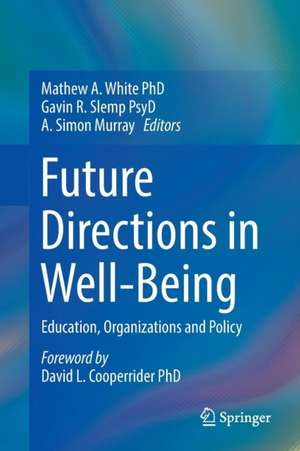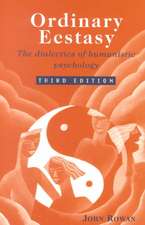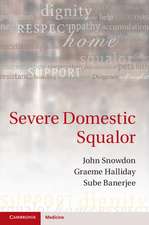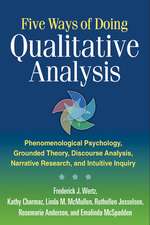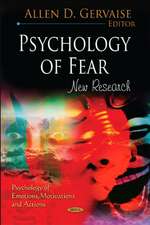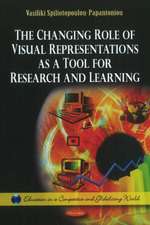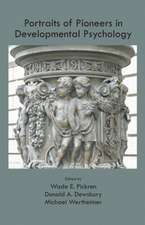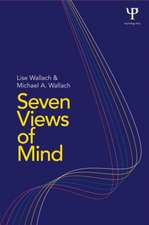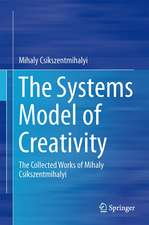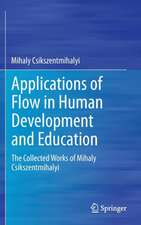Future Directions in Well-Being: Education, Organizations and Policy
Editat de Mathew A White, Gavin R. Slemp, A. Simon Murrayen Limba Engleză Paperback – 24 iun 2018
| Toate formatele și edițiile | Preț | Express |
|---|---|---|
| Paperback (1) | 486.80 lei 6-8 săpt. | |
| Springer International Publishing – 24 iun 2018 | 486.80 lei 6-8 săpt. | |
| Hardback (1) | 589.33 lei 6-8 săpt. | |
| Springer International Publishing – 26 iun 2017 | 589.33 lei 6-8 săpt. |
Preț: 486.80 lei
Nou
Puncte Express: 730
Preț estimativ în valută:
93.15€ • 97.58$ • 77.20£
93.15€ • 97.58$ • 77.20£
Carte tipărită la comandă
Livrare economică 08-22 aprilie
Preluare comenzi: 021 569.72.76
Specificații
ISBN-13: 9783319860275
ISBN-10: 3319860275
Pagini: 250
Ilustrații: XXV, 250 p. 22 illus.
Dimensiuni: 155 x 235 mm
Greutate: 0.4 kg
Ediția:Softcover reprint of the original 1st ed. 2017
Editura: Springer International Publishing
Colecția Springer
Locul publicării:Cham, Switzerland
ISBN-10: 3319860275
Pagini: 250
Ilustrații: XXV, 250 p. 22 illus.
Dimensiuni: 155 x 235 mm
Greutate: 0.4 kg
Ediția:Softcover reprint of the original 1st ed. 2017
Editura: Springer International Publishing
Colecția Springer
Locul publicării:Cham, Switzerland
Cuprins
Foreword; Lord O’Shaughnessy.- Part I. Education.- Overview; Mathew A. White, Dan Loton, Gavin R. Slemp and A. Simon Murray.- Chapter 1. Positive Education: Developing Skills for School Life and Beyond; Zoë Alford.- Chapter 2. Evolution of Student Leadership Following the Introduction of Well-Being; Alasdair McCall and Sam Beer.- Chapter 3. Opportunities for Technology in Promoting Resilience and Well-Being in Schools; Jane Burns and Melissa Weinberg.- Chapter 4. Healing and Growth in the Classroom: A Positive Education for Trauma-Affected; Tom Brunzell.- Chapter 5. Impact of Activity: Future Direction of Positive Education; Mathew A. White.- Chapter 6. Theology and Psychology in Conservation: Ellen T. Carry.- Chapter 7. Positive Psychology, A New Interpretative Lens for Scripture Defined; Theodore McCall.- Chapter 8. The Tao of Leadership; Lim Lai Cheng.- Chapter 9. Keeping Up with The Times: A Considered Approach to Measuring Youth Well-Being; Tan-Chyuan Chin.- Chapter 10. Positive Education's New Frontier: Curriculum Integration; Emily FitzSimons.- Chapter 11. Your Phone vs. Your Heart; Barbara Fredrickson.- Chapter 13. Partnering Evidence-Based Coaching and Positive Psychology; Suzy Green and Sean O'Connor.- Chapter 14. Strengths and Virtues: An Integrated Approach; Liz Gulliford.- Chapter 15. Perseverance, Achievement, and Positive Education; Margaret L. Kern.- Chapter 16. Creating Whole-School strategies That Last; Michelle McQuaid.- Chapter 17. Positive Education at the Cross Roads: Important Sign Points for Going in the Right Direction; Toni Noble.- Chapter 18. Strength Based Parenting: A New avenue of Practice and Research in Positive Psychology; Lea Waters.- Chapter 19.Systemic Change Plan: Character Strengths in the Middle Years Schooling; James Tamblyn.- Part II. Organizations.- Overview; Mathew A. White, Gavin R. Slemp and A. Simon Murray.- Chapter 20. Human Resource Management and Building a Positive School Culture; Annette Cinnamond.-Chapter 21. Let's be on High Quality Connecting as a Path for Fostering Well-Being at Work; Jane E. Dutton.- Chapter 22. Exploring the Impact of Social Media and Parents on Young People Character and Virtues; Blaire Morgan.- Chapter 23. On Heartfulness; Ryan M. Niemiec.- Chapter 24. Positive Psychology and Sport; Matthew Scholes.- Chapter 25. Using Appreciative Inquiry to Foster Positive Sport Leadership; Matthew French.- Chapter 26. University Settings: A New Frontier for Positive Education; Gavin R. Slemp.- Chapter 27. Coaching character: Winning on and off the Field; Paddy J. Steinfort.- Chapter 28. Motivation Outside In, Inside Out; Helen Street.- Part III. Policy.- Overview; Gavin R. Slemp, Mathew A. White and A. Simon Murray.- Chapter 29. Challenges in Defining and Measuring Well-Being and Their Implications for Policy; Felicia A. Huppert.- Chapter 30. Well-Being Literacy: The Missing Link in Positive Education; Lindsay G. Oades.- Chapter 31. Meta-Positive-Psychology; Veronika Huta.- Chapter 32. Momentum in the State of Well-Being: A South Australian Story; Gabrielle Kelly.- Chapter 33. Teachers as Facilitators of Student Flourishing in Positive Education: What Are The Political Implications?; Kristján Kristjánsson.- Chapter 34. An Eyes Open Approach to Teen Sleep Problems; Mike Oliver.- Chapter 35. Co-Designing New solutions to Support Young People's Mental Health and Well-Being; Michelle Blanchard and Nicholas Fava.- Chapter 36. Well-Being and academic Achievement: Towards a New Evidence-Based Educational Paradigm; Alejandro Adler.- Chapter 37. Advances and Challenges in Positive Education; Covadonga Chaves and Enrique Tamés.- Chapter 38. It's About Time for Positive Psychology to Get More Involved in Time Use Research; Dianne A. Vella-Brodrick.- Chapter 39. Why We Need Positive Education 2.0: Mathew A. White and Ash Buchanan.- Chapter 40. Mindfulness and Compassion as the Foundations of Living, Learning and Loving.- Appendix.
Notă biografică
Mathew A. White PhD is Director of Wellbeing at St Peter’s College – Adelaide where he serves on the Senior Leadership Team. As an academic, Mathew is a Principal Fellow and Associate Professor in the Melbourne Graduate School of Education - University of Melbourne, and an Affiliate in Cambridge University’s Wellbeing Institute. He has presented his research in the science of positive psychology and its evidence-based practice internationally. Mathew has authored journal articles, 20 book chapters and coedited two other scholarly volumes within the past three years. These books include Evidence-based Approaches to Positive Education in Schools: Implementing a Strategic Framework for Well-being in Schools (Springer, 2015) and Flourishing in Faith: Theology Encountering Positive Psychology (Wipf & Stock, 2017). He is currently writing a book on teaching character strengths in literature (Sense). Mathew is a member of the Education Committee of Adelaide’s largest residential university college, St Mark’s College. In 2017 he was awarded the Australian Council for Educational Leaders South Australian Leadership Medal. He is a Fellow of the Australian College of Educators, the peak professional association which represents educators across all sectors and systems in 2016.
Gavin R. Slemp Psy.D is a lecturer, academic, and Associate Director of Undergraduate Programs in the Centre for Positive Psychology, University of Melbourne. Here he teaches and coordinates the undergraduate breadth sequence in positive psychology – subjects which have been voted as among the most popular in the university by the students. With a Doctor of Organizational Psychology and as a registered Organisational Psychologist (AHPRA), Gavin’s research interests are primarily in the areas of employee wellbeing, autonomous motivation, the effects of people becoming active crafters of their work, positive education, and cross-cultural psychology. Before becoming an academic, Gavin worked in consulting in the area of Human Resources Advisory in Australia and the Asia-Pacific. In this role his work was primarily on the leadership development of executive teams and their direct reporting lines, as well as the design and implementation of training and development programs in large organisations.
Simon Murray is the 14th Headmaster of St Peter’s College, Adelaide – one of Australia’s oldest independent schools, with over 1467 students and 250 staff. He has had 30 years of leadership experience in education. Prior to his appointment to St Peter’s College, Simon was Headmaster of Canberra Grammar School and Bunbury Cathedral Grammar School. Simon was elected Chair of Association of Heads of Independent School of Australia from 2009 – 2011, representing over 390 member schools. He is a past Board member of the Independent Schools Council of Australia. He was appointed a Fellow of the Australian College of Educators in 2008 for his leadership in the independent school sector, and he is a Fellow of the Australian Institute of Management. Simon has presented at national and international conferences on wellbeing, leadership, cultural change, and future directions in education. He was the St Peter’s College representative for Dr. Seligman’s role as Adelaide’s Thinker in Residence – Department of the Premier and Cabinet. Simon was one of thirty leaders in education invited to participate in a Positive Education Summit on Wellbeing at 10 Downing Street. He is the foundation Chairman and a board member of the Positive Education Schools Association (PESA), a board member of the International Positive Education Network (IPEN), a council member of Adelaide’s largest residential university college, St Mark’s College, and an appointed member of the diocesan council in the Anglican Diocese of Adelaide.
Textul de pe ultima copertă
This book is a collection of essays advancing the discourse in well-being science, authored by key thought leaders in positive psychology and its variants, including positive education, character education, and positive organizational scholarship. The authors address topics such as the next big ideas in well-being research and practice, potential strategies, as well as current gaps and limitations of the field. This book will be of particular interest for policy makers, educators and practitioners, as well as researchers.
Caracteristici
Provides a collection of short, accessible essays focused on the future directions of the field Contributions of a wide variety of thought-leaders across the disciplines Advances the discourse in well-being science Includes a foreword by David L. Cooperrider PhD
